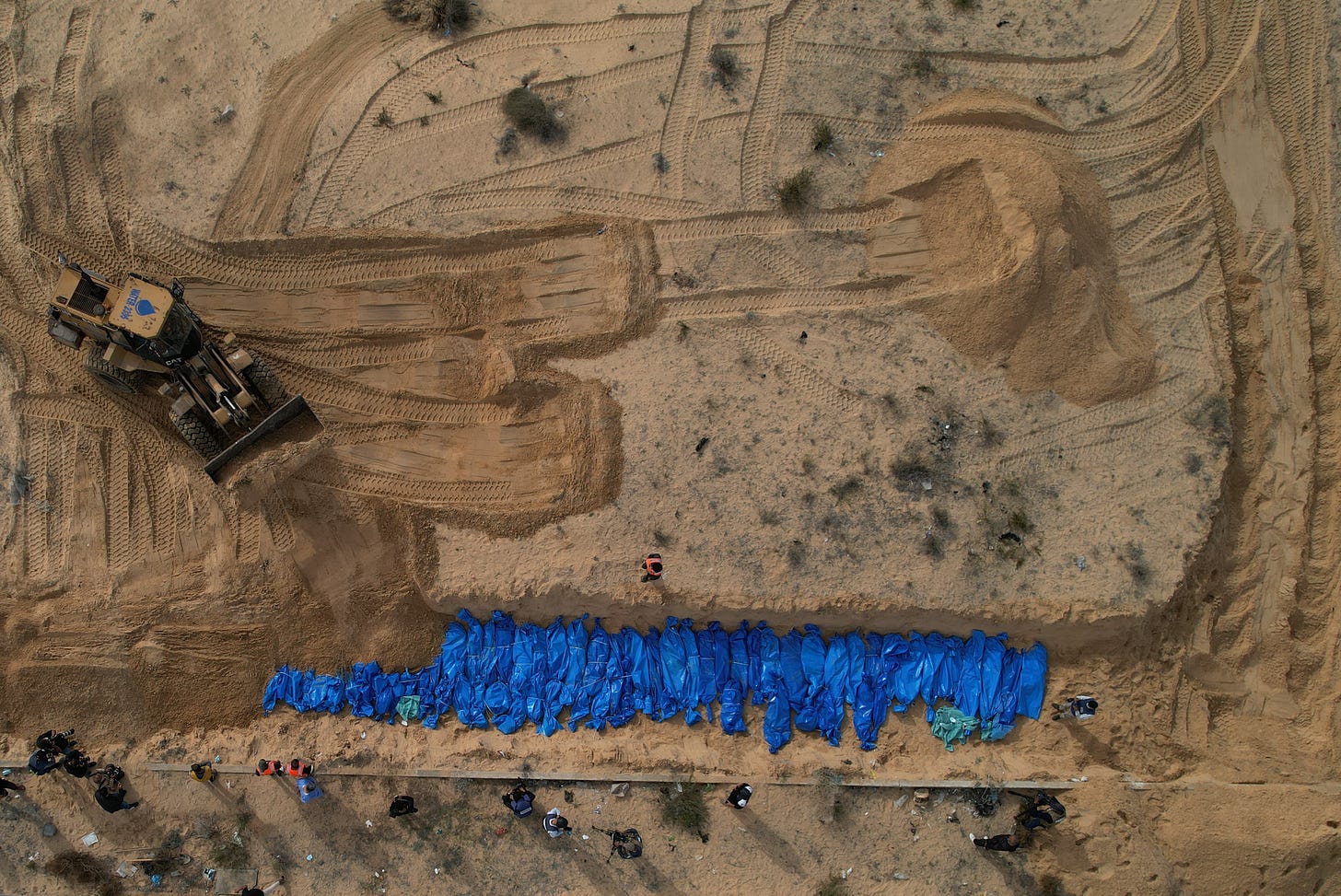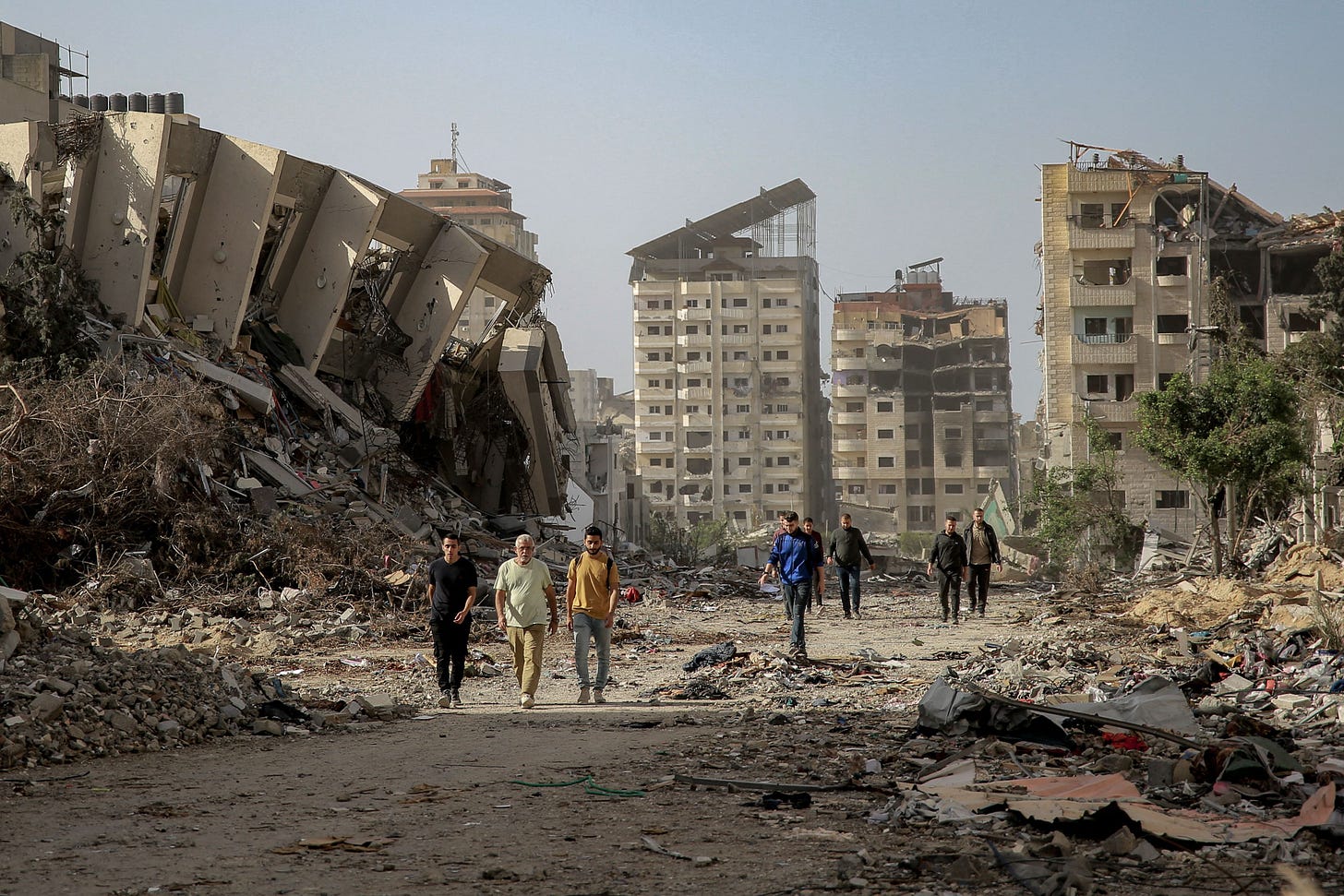Maybe some of you have had this experience in recent weeks: Seeing countless pictures of dead children, and videos of brutal airstrikes that wipe out residential neighborhoods, and reading reports of the historically high rate of civilian deaths, and taking in firsthand accounts of civilians telling of awful conditions and lost family members and devastated lives, you come to the conclusion that an atrocity is being perpetrated in Gaza. The weight of the plain, unvarnished evidence of ruined lives, laid out before us all, is its own sufficient argument. When you voice this argument, you receive the following reply: This is war. Don’t you understand that this is war? This is what happens in war. You cannot be surprised that bad things happen in war.
The state of war is the great eraser of all sin. This is its most dangerous trick. Declare a war, and all is fair. Declare a war, and legitimacy blankets all actions like a gentle snow. Questions of right and wrong and “laws of war” are suspended until the war is concluded. Apologies can only be made in retrospect. History’s judgment is the sole balm to the souls of the dead. For now, the magic wand of war creates a bubble of prehistoric, pre-Enlightenment, pre-rational, pre-moral existence, where the judgments of modern societies are set aside in favor of the return of the state of nature. For everyone who considers a dead child proof that something is wrong, there is another person who considers the existence of a war as proof that nothing can be wrong.
“War,” a word, a concept that we made up, purports to sit outside of and superseded everyday human experience. It purports to wave away the totality of ethical thought by its mere existence. Violence has been around forever; fights are not new; bloodshed, murder, and destruction have always been things that people have done. As parts of life, as old as life itself, they are subject to all of the normal judgments we impose on all parts of life. Violence is bad. Acts of violence are condemned. Yet wrap those acts of violence in the shroud of War, and they magically become not condemnable, but merely regrettable. What were once taboos become Sad But Necessary acts. Not only are once-forbidden things no longer condemned; in the context of war, they become things that it is not even necessary to evaluate for condemnation. The label itself is enough to exempt them from the arena of critical thought.
Blow up an apartment building. This is a staggering act. This is front page news, an object of fascination, something that makes people cover their mouths in disgust and fascination. Blow up an apartment building in a war. This is nothing. This is normal. This is just another day, unremarkable, to be expected. The idea of war is the only difference. It enables both the perpetrator of the attack and all of us who watch from afar to live without carrying its moral weight—to decline to shoulder the burden of the horror. In one case, we recognize the bloodstained rubble as an abomination. In the other case, we accept it as part of the natural order. And what is the difference between the two cases for the people dead in the rubble? Nothing. They are dead just the same. The illusion that war stands apart from the normal world benefits only us, not them.
It is easy to understand why someone who wages war would embrace this illusion. The question is why the rest of us acquiesce to it. Perhaps it’s natural to seek out its soothing balm. It sets the world in order. For witnesses, it offers an explanation. For victims, it offers a justification. The man whose legs are blown off will never walk again no matter what. But he can, at least, have a reason to lean on as his crutch.
War is an incantation. The church of nationalism utters it and basks in salvation; all who accept its grace are able to be cleansed as well. We all understand the concept of self-defense, but war is a blessing that offers to remove the hard grimace from that dirty task, a path to move from defense into offense without passing through the hell of self doubt. War is mankind’s ultimate religion. It is the faith-based belief in our own righteousness in the face of all evidence to the contrary.
Consider the difference between the paradigm of war, and the paradigm of crime. When a crime is committed, the response is to bring justice to the people responsible for that crime. But in war, the justice is death, and it comes not only for those directly responsible for the offense, but for their families and neighbors and children. If governments reacted to international violence using the paradigm of crime, the world would be an infinitely better place. After 9/11, our goal would have been to get Osama bin Laden. Instead, we launched an unwinnable global war that killed a million people. After the murders and kidnappings that Hamas committed on October 7, the goal could have been to find and punish those directly responsible for those crimes. Instead, thousands of tons of bombs were dropped on top of millions of civilians who happened to live in the same area. The only reason that governments prefer “war” to “crime” is that investigating and prosecuting crime carries with it a set of expectations of ethical conduct. War offers blanket legitimacy to the laziest and most deranged actions of revenge. If you care nothing about human life, it is easier to take the option with less hassle.
It is in the nature of governments to become inhuman if they are not kept in check. But we, the humans, do not have to do the same thing. To accept the idea that, for example, if a member of Hamas is hiding in a hospital, it is okay to blow up the hospital, is to have lost your humanity. It is to succumb to the hypnotism of war. All of the public accoutrements of war—the ubiquitous flags, the parades, the uniforms, the press conferences, the breathless reporters in helmets, the sober news coverage, the nationalism, the football game jet flyovers, the military recruiting television ads, the tight constriction of the bounds of public debate, the obligatory nod to the necessity of war that must accompany any and all statements from public figures—these things exist to pave the road that leads to the place where you say that the death of the children who were blown up in the hospital or in the houses or in the streets was sadly necessary, in order to carry out the war. Polished and perfected over thousands of years, this system is fabulously effective at marshaling all the humans into cheerleaders of a predatory state. It is this path, bristling with collective pride and duty, that has led to most of the greatest catastrophes in human history.
There is nothing new to be said about this that has not been said during wars of the past, usually with little effect. We cannot hold up our hands and stop the war, but we can control how we think. First, think of human rights; then evaluate the things that are happening in that light. This rule is not perfect, but it can clarify moral judgments in a way that does not get so obscured by the waving flags. War is the antithesis of human rights. War is the seductive embrace of the false idea that when we are harmed, the obligation to respect human rights disappears for us. It doesn’t. Even if you ignore it. The sins of war are not erased. They’re just buried deep down in a mass grave. But know, always know, that one day they will be dug up again.
Also
Resources to help you support a ceasefire can be found here.
For the next week, I may be slower than usual publishing, because I am currently recording the audio version of my book. In just a few months, you will be able to either read the words in my upcoming book about the labor movement, “The Hammer,” or—for an equal price—hear me reading those same words aloud, instead. I urge you in the strongest terms to preorder my book—the print version or the audio version, take your pick. There is no better way to get more labor books published than to show the publishers that people love to buy labor books.
Thank you to everyone who has subscribed to How Things Work over the past several months. I appreciate everyone who reads and shares this work. In material terms, paid subscribers make it possible for me to do this and still pay the bills. If you want to support this publication in a way that will earn my deepest gratitude, become a paid subscriber today. You can cancel a more evil subscription to balance it out.





This might be your best yet and you have a lot of competition.
I wish I could write like you!